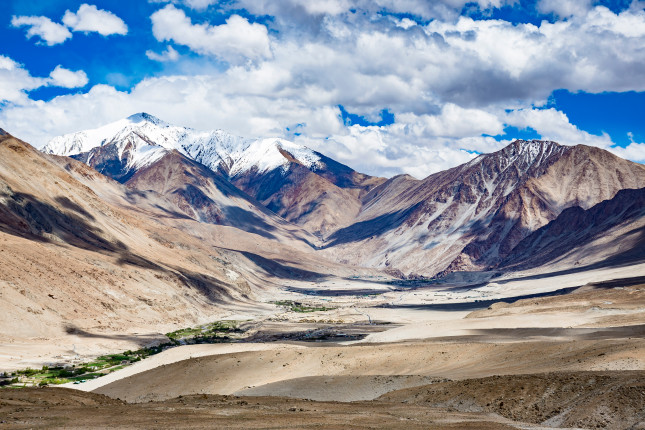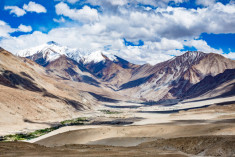-
Starting at the Top: Environmental Security in the Himalayas
January 14, 2020 By Bishnu Raj Upreti As an inhabitant of the Himalayan region of Nepal, where 8 of the 10 highest peaks of the world are situated, I am experiencing first hand several environmental stresses and insecurities. Many of the high mountains I can see from my village, once covered in snow, are turning black. Neighboring areas are experiencing massive out-migration and demographic changes. Consequently, agriculture in the region is facing an unprecedented crisis.
As an inhabitant of the Himalayan region of Nepal, where 8 of the 10 highest peaks of the world are situated, I am experiencing first hand several environmental stresses and insecurities. Many of the high mountains I can see from my village, once covered in snow, are turning black. Neighboring areas are experiencing massive out-migration and demographic changes. Consequently, agriculture in the region is facing an unprecedented crisis.Droughts, irregular rainfall and erratic floods, landslides and mudslides, forest fires, pollution of our land and water, and energy insecurity are frequently observed in Nepal. River systems born out of the Himalayas are shrinking. Erratic climate behavior is heavily affecting the flora and fauna and contributing to biodiversity loss.

As an inhabitant of the Himalayan region of Nepal, where 8 of the 10 highest peaks of the world are situated, I am experiencing first hand several environmental stresses and insecurities. Many of the high mountains I can see from my village, once covered in snow, are turning black. Neighboring areas are experiencing massive out-migration and demographic changes. Consequently, agriculture in the region is facing an unprecedented crisis.
Droughts, irregular rainfall and erratic floods, landslides and mudslides, forest fires, pollution of our land and water, and energy insecurity are frequently observed in Nepal. River systems born out of the Himalayas are shrinking. Erratic climate behavior is heavily affecting the flora and fauna and contributing to biodiversity loss.
In addition to the mounting environmental stresses, the mountain region is facing growing poverty, widening disparities in wealth, corruption, and poor governance. I see a growing militarization and radicalization of society, and increasing ethnic and communal tensions. These environmental and societal stressors are connected, including the politically motivated exploitation of natural resources.
In short, the Himalayan region is facing an unprecedented political, economic, and environmental crisis. The effects of this crisis will be felt across the globe.
I see two paths forward for the region. One, a future marked by increased social tensions, heightened intra- and inter-state conflict, political instability, and growing radicalization; the other, a more stable and sustainable future marked by cooperative efforts to seek solutions collectively. Achieving this second path will require concerted action from across research, policy, and practice communities. And it will require close collaboration and integration of efforts across sectors to address these interrelated and complex environmental and climate-related challenges.
Regional and global efforts should seek to address the root causes of instability in the region, including the poverty, marginalization, and feelings of powerlessness that have been further compounded by ecological degradation. Addressing these issues through a lens that connects science, policy, and practice is important to improving both stability and natural resource management in the region.
Decentralized efforts that encourage and enable community participation and stakeholder engagement, increase the effectiveness and responsiveness of local institutions, and promote regional and trans-boundary cooperation must be prioritized. Creating knowledge-sharing public discourse mechanisms and assisting in the development of negotiation and conflict management skills will enable local actors to lead resilience-building efforts. My hope is that institutions like the Wilson Center continue to play a great role in reorienting existing debates and research priorities to tackle the interconnected issues of environment, health, and security. Because, as we see every day in the Himalayas, the well-being of communities is tied to the well-being of the planet.
Bishnu Raj Upreti is the Executive Director of the Nepal Centre for Contemporary Research (NCCR). He previously served a 9 year term as the South Asia Regional Coordinator for the National Centre of Competence in Research North-South.
Sources: International Centre for Integrated Mountain Development, Identifying Emerging Issues in Disaster Risk Reduction, Migration, Climate Change and Sustainable Development: Shaping Debates and Policies, South Asia Regional Coordination Office of the Swiss National Centre of Competence in Research
Photo Credit: Photo via Shutterstock. All rights reserved.
 A Publication of the Stimson Center.
A Publication of the Stimson Center.

 As an inhabitant of the Himalayan region of Nepal, where 8 of the 10 highest peaks of the world are situated, I am experiencing first hand several
As an inhabitant of the Himalayan region of Nepal, where 8 of the 10 highest peaks of the world are situated, I am experiencing first hand several 

